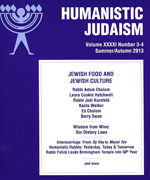Humanistic Judaism, Summer/Autumn 1977
This issue is about Congregation Beth Or. Congregation Beth Or was a reform congregation. It is now a humanistic one.
Beth Or is humanistic-because of the special power and integrity of its rabbi, Daniel Friedman-And also because of the unique courage and hutspa of its own members.
Beth or is also humanistic because reform Judaism is less than it should be.
The Jewish Reformers of the 19th century prided themselves on being the avant-garde of religious innovation-the rescuers of Jewish identity for the age of science. They saw themselves as bold and radical-eager to remodel the structure of Jewish authority.
The Jewish performers of the late 20th century are tired and cautious. They pride themselves on their return to tradition. Preferring nostalgia to creativity, they have become the promoters of Halachic antiquities. Fearful of Orthodox and Conservative disapproval, they label every surrender to old authority as a concession to the unity of the Jewish people. All the hutspa is gone. All the radical passion is absent. Pleading for the approval of the past, they have no energies to deal with the future.
What happened?
Not really very much.
In the very beginning the radical image of Reform was more glitter than substance. Using a Protestant model, the early reformers tried to demonstrate that Orthodox Judaism had betrayed the real Jewish past. Reform Judaism was not new at all. It was simply the revival of the original teachings of the great Jewish prophets.
From the very beginning Reform presented itself is ultimately traditional.
And that was silly.
Reform Jewish behavior, as any mildly retarded observer wouldn’t have noticed, had nothing at all to do with the tradition. Not only would the Talmudic rabbi have found it offensive, the Biblical prophets would have preferred Astarte worship to Abraham Geiger.
The early reformers were forced to distort the story of the Jewish past in order to kosherize the Jewish present. It never occurred to them that kosherizing was unnecessary. Admitting innovation has greater dignity than depriving heroic figures of the past their real thoughts and feelings.
If the Talmud was essentially irrelevant to the western urban lifestyle, then the Torah was even worse. Protestant Biblical piety is a joke amongst people who want to be winners in a secular world.
In the end, Reform- and most of all classical Reform chose the Bible is the ultimate sacred Jewish symbol. The religious energies could no longer be directed to real creativity. It had to be wasted proving the unprovable- demonstrating that the sprit of the Torah was essentially the same as the spirit of humanistic science.
Reform Judaism left courage. And the desperate effort of social climbing, the classical reform tried to please the protestant establishment. And that guilty response to this desperate effort, the new were firm tries to please additional geez.
The net result is humiliation and fiasco. Because, quite frankly, nobody can do Protestantism better than Protestants. And nobody can do traditional Judaism better than traditional Jews.
In both cases, Reform started out as the victim of other people’s initiative – a second-rate imitation of what the imitators could do better. Behind the radical mouth lay the obsequious need to please. Reform sought out its own oppressors.
When the Protestant bourgeoisie lost their clout, Conservative Judaism moved in to terrorize. Once the enormous social snobbery of German Jews was overwhelmed by Russian Jewish success, the social barriers that made reform seem boldly anti-traditional broke down. Reform Judaism was then able to show its true colors.
It is not the way many latter relics of the old classical Reform have maintained, that the old Reform was truly radical before it was destroyed by the new Reform. The need to apologize is intrinsic to both varieties.
The greatest ‘crime’ of both old and new Reformers is that, in the name of serving tradition, they distort it. Unable to stand up courageously to the hostility of their ancestors, they preferred to do cheap psychotherapy. The search for ‘roots’ became the search for approval.
Humanistic Judaism is an attempt to do what Reform Judaism should have done. Its main concern is not with the past. It looks to the future. Whether the past loves us or hates us is irrelevant to our long-run welfare is. Whether the future consequences of our present behavior love or hate us does make a difference.
We ought to understand our past without needing it. To feel that insight is true liberation.

